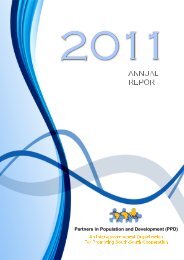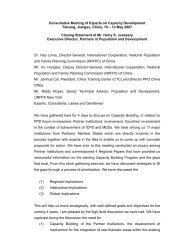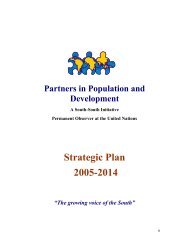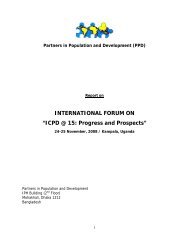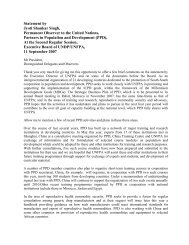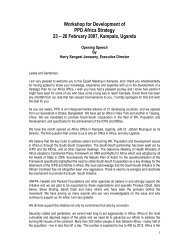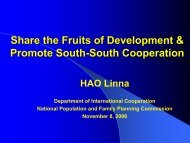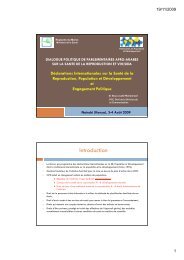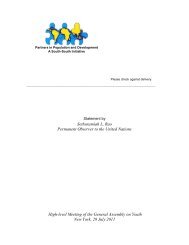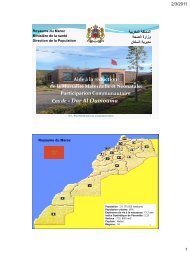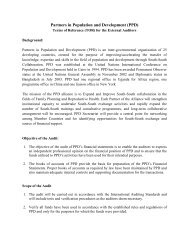Statement by H.E. Dr. Ajaratou Isatou Njie Saidy, The vice president ...
Statement by H.E. Dr. Ajaratou Isatou Njie Saidy, The vice president ...
Statement by H.E. Dr. Ajaratou Isatou Njie Saidy, The vice president ...
You also want an ePaper? Increase the reach of your titles
YUMPU automatically turns print PDFs into web optimized ePapers that Google loves.
Check Against Delivery<br />
STATEMENT<br />
BY<br />
HER EXCELLENCY DR AJARATOU ISATOU<br />
NJIE SAIDY<br />
THE VICE PRESIDENT AND<br />
MINISTER OF WOMEN’S AFFAIRS OF THE<br />
REPUBLIC OF THE GAMBIA<br />
AT THE<br />
INTERNATIONAL INTER-MINISTERIAL CONFERENCE ON<br />
“EVIDENCE FOR ACTION: SOUTH-SOUTH COLLABORATION FOR<br />
ICPD BEYOND 2014<br />
10 TH NOVEMBER 2012, DHAKA BANGLADESH<br />
1 | P a g e
Mr Chairman<br />
Hon. Minister of Finance, Government of the People’s Republic of Bangladesh H.E. Mr. Abul<br />
Maal Abdul Muhit,<br />
Chair of PPD Board Hon. Minister of Health and Family Welfare, Government of India, His<br />
Excellency Mr Ghulam Nabi Azad<br />
Hon. Vice Minister, National Population and Family Planning commission, Government of the<br />
People’s Republic of China, H.E. Mr. Chen Li<br />
Hon. Minister of Health and Family Welfare, Government of the People’s Republic of<br />
Bangladesh and Member, PPD Board H.E. Prof. A. F. M. Ruhal Haque<br />
Hon PPD Board members<br />
Partner Country Coordinators<br />
Distinguished delegates<br />
Ladies and Gentlemen<br />
All other protocols respectfully observed<br />
I bring you greetings from my President Sheikh Professor <strong>Dr</strong> Alhagie Yahya A.J.J Jammeh, the women of<br />
the Gambia and rest of the Gambian population to the Prime Minister and people of Bangladish and to<br />
member countries of Partners in Population and development. Special thanks and appreciation go to the<br />
Government of the People’s Republic of Bangladesh and other Partner countries for the support and<br />
assistance provided in the organization of this Conference.<br />
Excellencies, Ladies and Gentlemen<br />
<strong>The</strong> theme for this conference “evidence for action: south-south collaboration for ICPD beyond 2014” is<br />
both apt and timely. A review of the International Conference on Population (ICPD) Cairo 1994<br />
Programme of Action has just begun and thus this conference could not have come at a better time than<br />
now.<br />
This august gathering will recall that the 1994 International conference on Population and Development<br />
was quite historic and a landmark event. <strong>The</strong> two previous conferences were marred with skepticism and<br />
misunderstanding on population and development issues. Important paradigm shifts in this conference<br />
include the recognition that population is not just about counting of numbers but what to do to improve<br />
the quality of life of the peopl including the protection of the rights of women and girls among other<br />
priorities.<br />
2 | P a g e
During this conference, which I was privileged to –attend, a consensus was reached on the stance that<br />
access to reproductive health, sexual health and family planning particularly for the young and the<br />
protection of the rights of women and girls are important pre-requisites in the attainment of sustainable<br />
development. <strong>The</strong> development of women and the young surely trickles down to the rest of society. <strong>The</strong><br />
meeting also recognizes the need to address the high population growth rates as well as other<br />
unfavourable health and demographic indicators.<br />
This review of the Cairo ICPD POA 1994 which has begun will identify progress and achievements<br />
towards the objectives set out in this POA which gave birth to our partnership. <strong>The</strong> ICPD beyond 2014<br />
will also accord us the opportunity to influence the future of global population and development policies<br />
at national, regional and global levels among others.<br />
<strong>The</strong> expectation of this conference therefore will be a highlight of the successes and challenges within<br />
the framework of south south cooperation in the implementation of both the 1994 ICPD POA, 1995<br />
Beijing Platform for action and the recommendations of the ICPD + 5, +10 and +15 reviews as well as<br />
the MDG reviews.<br />
I acknowledge that significant achievements have been registered since the birth of this partnership but<br />
we also continue to face challenges that have tended to undermine our achievements. Whilst I have no<br />
doubt in my mind of the political will of our various governments, the availability 0f enough wherewithals<br />
particularly resources in implementing population activities has always been a problem<br />
To highlight a few achievements since the 1994 Cairo conference, reports show that globally, fertility<br />
levels have declined mainly due to increasing literacy rates and participation of women in the labour force<br />
and the increasing use of contraceptives. Total Fertility Rate (TFR) has fallen from 3.2 children per<br />
woman in 1994 to 2.5 in 2010 and the population growth rate has fallen from 1.5% to 1.2%.<br />
Despite these achievements, the World Population continues to increase. It had reached 7 billion in<br />
2011, and it is projected to reach 8 billion in 2024 and 9 billion in 2045. <strong>The</strong> less developed world will<br />
account for 97% of the future population growth.<br />
Mr Chairman<br />
Having adopted the Cairo 1994 ICPD Programme of Action and the 1995 Beijing Platform for Action and<br />
its critical areas of concern, <strong>The</strong> Gambia revised its Policies accordingly to incorporate population and<br />
gender issues which continue to be recognize as an important pre–requisites for sustainable<br />
development. <strong>The</strong> Government of <strong>The</strong> Gambia therefore continues to invest in human, material and<br />
financial resources in addressing population and development concerns which have yielded positive<br />
3 | P a g e
esults. For example, the 2003 Population and Housing Census have shown a decline in TFR from 6.01<br />
per children per woman to 5.4 during the period 1993 to 2003. Maternal Mortality in Gambia has<br />
reduced from 1050 per 100,000 live births in 1993 to 730 per 100,000 live births, in 2000. <strong>The</strong> Infant<br />
Mortality Rate has reduced from 78 per 1000 live births in 1990 to 66/1000 live births in 2000 and it is<br />
estimated to have further reduced to 57 per 1000 live births in 2010. Neonatal mortality has also reduced<br />
from 42 per 1000 live births in 1990 to 31 per 1000 live births in 2010. It is our hope that further<br />
improvements may have occurred in these rates and that will only be known when the results of the<br />
2012 Demographic and Health Survey and the 2013 Population and Housing Census results are<br />
available.<br />
<strong>The</strong> Gambia has already achieved the MDG target of universal access and gender parity in lower and<br />
basic cycles of our education system.<br />
Regarding rights of women and girls, <strong>The</strong> Gambia has adopted and ratified a number of national and<br />
international instruments that seek to promote gender equity, equality and empowerment of women in<br />
line with the 12 Beijing critical areas of concern. <strong>The</strong>se include but not limited to: UN CEDAW, AU<br />
Protocol on the Rights of Women, the 1997 Constitution of the Gambia that guarantees the rights of<br />
women and girls, the Alternative Dispute Resolution, Legal Aid, the Ombudsman and girls scholarship<br />
schemes all of which go to promote the rights of women and girls.<br />
However, other demographic indicators e.g. HIV infection among the younger population, teenage<br />
pregnancy, and maternal deaths are believed to have declined over the years but lack of up-to-date and<br />
reliable data makes it difficult to prove this as we await the results of the 2012 DHS and 2013 Population<br />
and Housing Census.<br />
<strong>The</strong> government of the Gambia strongly believes in the principles of universal access to reproductive<br />
health and ser<strong>vice</strong>s including HIV/Aids, and believes that women have a right to decide freely when to<br />
have children and should be given the means to do so through information, education and<br />
communication.<br />
<strong>The</strong> government of the Gambia continues to demonstrate high political will in providing health ser<strong>vice</strong>s to<br />
all Gambians at affordable prices and most importantly the provision of free maternal care to all women<br />
and their children and the provision of adolescents and youth friendly RH centres in the regions.<br />
Mr. Chairman<br />
While counting successes in implementing our various development programmes, we continue to face a<br />
number of challenges which include socio-cultural believes/practices resource inadequacies and the<br />
youthfulness of the population. Over 45% of the Gambian population is below the age of 15 years and 22<br />
4 | P a g e
per cent aged between 15 and 24 years. This youthful age structure means a high potential for rapid<br />
population growth in the future as well as a high dependency burden which continues to pose challenges<br />
to sustainable development as it relates to health, education and employment among others.<br />
In addition, growth in the job market in <strong>The</strong> Gambia as in other Partner countries is not keeping pace<br />
with the high turn-over of school leavers and as a result there is high unemployment among the youth.<br />
Nonetheless, the government continues to create the enabling environment with opportunities for all<br />
Gambians to be involved in agriculture and the informal sector. As part of its mechanisation drive,<br />
Government has provided over the years the machinery and related farm inputs to boost agriculture in<br />
the country.<br />
Mr. Chairman<br />
It is worth noting that unless the international community and governments fulfil their funding<br />
commitments towards addressing population and development issues the developing countries in<br />
particular will find it difficult to tackle challenges posed <strong>by</strong> our population dynamics<br />
Despite all the challenges outlined above, the Government of the Gambia is still committed to managing<br />
its population effectively and efficiently. in order to accelerate the pace of socio-economic development<br />
and ultimately improve the quality of life of all Gambians.<br />
Excellencies, Ladies and Gentlemen,<br />
At this juncture, I wish to thank PPD for organizing the international inter-ministerial conference on<br />
“Evidence for Action: South-South Collaboration for ICPD beyond 2014”. <strong>The</strong> significance of this meeting<br />
cannot be overemphasized as there are global operational reviews underway on the implementation of<br />
the ICPD PoA to prepare the agenda for ICPD beyond 2014. PPD has rightly set the tone and goal of the<br />
conference so as to develop a southern consensus and political commitment for ICPD beyond 2014 and<br />
MDGs beyond 2015.<br />
I learnt that the outcome of the Conference will be a declaration reflecting the views and<br />
recommendations from southern countries and other stakeholders which will contribute to and lay the<br />
foundation for preparations for ICPD beyond 2014 and also MDGs beyond 2015.<br />
5 | P a g e
Whilst wishing you success in your deliberations, I pray that Allah Subuhanahu Taallah bless our<br />
partnership for the attainment of peace and prosperity for our various populations.<br />
I thank you for your kind attention.<br />
6 | P a g e



